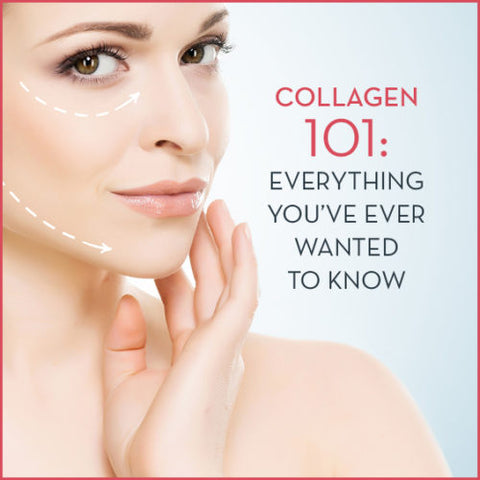
Collagen is one of the most important components of your skin, especially for maintaining your youthful appearance! Here is the key things you should know:
Collagen is a protein. In the skin, collagen is found in the dermis or deeper layer of your skin. It is responsible for maintaining the structure and firmness. Another vital function of the collagen is it works to repair the skin after a scrape or a cut. The body actually contains 28 different types of collagen, which collectively create strength and elasticity.
As we age, the collagen in our skin is damaged and breaks down, slowly collapsing it's structure causing a thinner, more fragile skin with deeper and deeper wrinkles. Our all-important barrier becomes weaker and more vulnerable. Collagen deterioration in the body is also associated with a number of other health complications, including respiratory problems, joint stiffness and loss of teeth.
The main culprit, for damaging our collagen production in our skin as we age, is UVA rays. These are the sun’s rays that are at full strength all year round and penetrate through glass. This is also the reason that we recommend sunscreens all year not just in the summer when UVB rays (burning rays) are more prominent.
By the age of 30, both men and women will lose around 1% of their collagen per year every year.
One of the key components to any age management program must therefore be to boost collagen production. The good news is there is a myriad of effective products, treatments and foods available to help boost collagen production.
Stimulating collagen in your skin from within
Foods
Here are a few foods important to boost in your diet for enhancing collagen production/repair:
Fish
Omega 3 fatty acids are the perfect nutrient for collagen production. In particular salmon and black cod are great sources of Omega 3 and therefore, collagen. Be sure to also eat the skin.
Shellfish
Contains copper, which is a vital natural mineral required by the body in binding collagen and elastin.
Prunes
Wonderful and natural antioxidants, eating 5 to 6 prunes every day will help to combat collagen reduction.
Oranges & Grapefruit
Your body uses Vitamin C to make collagen. Low levels of vitamin C reduce the body’s ability to replenish collagen stores.
Pineapple
Pineapple is naturally high in the mineral manganese which is required for collagen production.
Tomatoes, Peppers and Beets
Excellent sources of another powerful natural antioxidant called Lycopene.
Turkey
Contains carnosine which is believed to slow down the collagen damaging aging process called cross-linking.
At - Home Topical Treatments
The first step should always be protecting from damage!
Vitamin C
Vitamin C is an antioxidant necessary for collagen production as it helps to neutralize harmful free radicals that damage skin cells and collagen protein. For a big skin protecting and repairing boost applying it topically each morning in a specialized serum is unparalleled.
Our are our favourite topical serums high in vitamin c:
GM Collin Vital C15 Serum - great for all skin types
Skinceuticals CE Ferulic – great for sensitive, dry sun-damaged skin
Skinceuticals Phloretin CF – best suited for normal to oily skin with pigment damage.
Skinceuticals Serum 10 – for sensitive skin
Yonka Serum C20 - exceptional for sensitive and dry skin types due to it's unique, highly innovative and effective oil-based delivery system.
For more info on anti-oxidants click here.
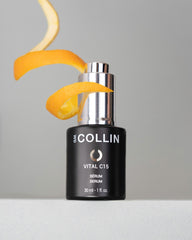
Sunscreens - this should be an obvious one! Wear daily and reply as often as necessary!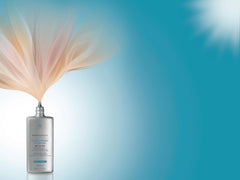
Stimulating and Repairing
There are a few key ingredients known to effectively repair and stimulate collagen production - Alpha Hydroxy Acids, Peptides and Retinoids. You don't need to use them all and in many cases you shouldn't. Depending on your skin we recommend alternating: a retinoid for several months, then a peptide solution then an alpha hydroxy acid treatment.
Retinoids
Retinoids are the gold standard for boosting collagen production and reducing the appearance of fine lines, wrinkles and age spots by suppressing genetic collagen regulation. Retinoids are available in specific percentages to use topically. The most care must be taken when choosing to use a retinol to prevent unwanted side effect! Learn more about retinols here and here and here. The best way to learn to use retinol for your unique skin type and concerns is to book a Clinical Skin Care Consultation with one of our Master Clinical Estheticians.
When used correctly retinol-based creams are highly effective and a must for most skin types for creating a youthful appearance.
Here are our favourites:
GM Collin Advanced Retinol+ Night Cream
GMC Medical .5 Retinol Complex
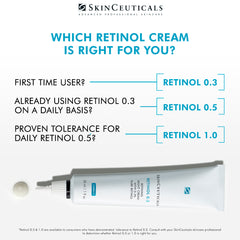
Alpha Hydroxy Acids
Alpha Hydroxy acids like retinoids stimulate new collagen producing but unlike retinoids they do this from the outside - in. They quickly exfoliate, smooth and brighten by removing dead surface skin cells with their low ph. Like retinoids they come in different strengths. Certain compositions will not only smooth the surface but also stimulate collagen synthesis. The best way to get the results you desire for your unique skin is to ask one of our experts. Like retinoids, not just the % is important but also the frequency of use to avoid undesirable side effects.
Here are some of our favourites:
GM Collin Poly Acid Peel Serum
Glymed + Anti Age Exfoliant Mask
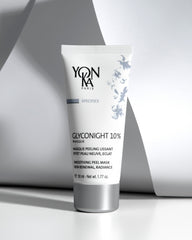
Peptides
Peptides are a revolutionary way we have to repair aging skin cells! For years scientists have been trying to find ways to get proteins into the deeper layers of the skin to help repair and renew. It was like trying to fit a a square peg into a round hole. Until the game changing discovering of how to break apart a protein (they are made up of a chain of amino acids in "peptide" segments). Breaking a protein into these smaller components allowed them to effectively penetrate the skin in order to stimulate renewal!
Prior to this discovery, creams, lotions or gels that contained collagen did not stimulate repair or renewal of your collagen. For many it was considered a marketing trick - if it said it contained collagen you might assume that it repaired your collagen and reduced your wrinkles. It did not and it still doesn't if it doesn't contain the protein in it's peptide format. Collagen (non-peptide format) does have a very interesting effect on the skin though. It is an excellent ingredient for sensitized and dehydrated skin. It is very soothing to the skin surface!
The exciting part about peptides is that they do their job without the potential irritation of a retinol or an Alpha hydroxy acid! Almost every skin type and condition can tolerate most skin renewing peptides.
Our favourites come from one of the world leaders in the use of collagen for skin repair - GM Collin!
GM Collin Collagen Supreme Serum
GM Collin Marine Collagen Revitalizing Cream
GMC Medical AGE Skin Defense Cream
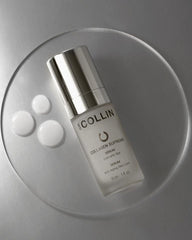
Clinical Treatments
LED Light Therapy
LED light therapy, particularly red and infrared light wavelengths, is used to boost collagen production and stimulate the skin’s natural healing abilities.
LED Light therapy is a professional device and treatment that is gentle, painless and highly effective. It is best performed initially as a series of 8 weekly or twice weekly treatments maintained with once monthly treatments.

For more information click here.
Laser/BBL Photo Facials
We have two other light based devices for collagen stimulation and repair. They are more assertive than our LED and have other very interesting corrective components.
Our laser treatment works by heating the skin to a temperature with a laser to a temperature that effectively stimulates collagen and other skin cells beneficial for creating a younger looking and acting skin. This requires several treatments in a series and several months to notice and appreciate the benefits.
Our BBL Photo Facial stimulates collagen synthesis very similar to our laser treatment but it also corrects any hyperpigmentation, redness and vascular concerns! The results for age related skin concerns are "WOW"! For more information click here.
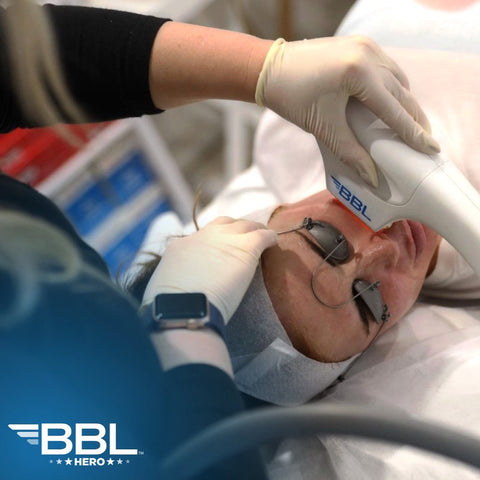
Chemical Peels
We love chemical peels for their multi facetted approach to improving the skin. They are used to create an injury of a specific skin depth with the goal of stimulating new skin growth and improving surface texture and appearance. The way they exfoliate (compared to a topical scrub) stimulates collagen and more evenly distributes skin pigment causing an immediate brightening effect.
The application of specialized acids, even in low percentages, creates stimulation in the skin. This stimulating and building of collagen will fill in fine lines and reduce the appearance of large pores and scarring over mulitple treatments.
The most effective treatments are done in a series with treatments every one to two weeks. After four to six treatments maintain with monthly or seasonal treatments depending on the depth, skin type and condition.
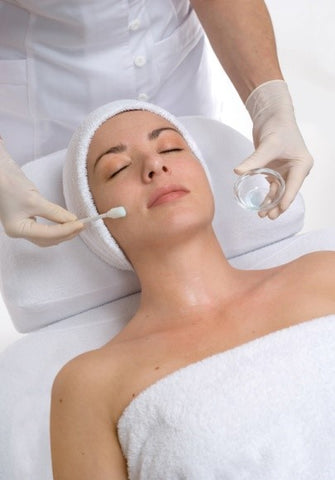
Our chemical peel series includes our Signature Skin Transformation Series, 8 Week Skin Transformation Series and our Skin Boosting Peel Program. Almost all of our Rejuvenating Facial protocols include a chemical peel as well as our Signature Facials. For more info and pricing click here.
We hoped this helped to learn a little more about this important skin protein and how to help your skin look it's best for many years to come!
